Toothache is not a specific dental problem, but it is a manifestation of many other dental diseases that can lead to many dangerous complications if not treated promptly. What medicine to take for toothache to relieve pain depends on many factors such as oral health as well as the specific cause of toothache. You can refer to the common toothache pain relievers that BIK International Dental Clinic has compiled in the article below.
1. Causes of toothache
Persistent toothache can be due to the following reasons:
1.1. Tooth decay
Tooth decay is a common dental disease that anyone can encounter from adults to children. The main cause of this condition is improper oral hygiene, leftover food particles gradually create conditions for bacteria to grow and damage tooth enamel. At this time, you will feel your teeth become more sensitive, easily aching when exposed to hot or cold food suddenly.
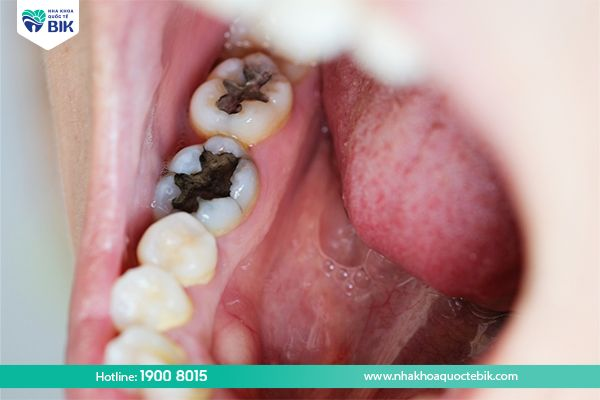
1.2. Pulpitis
The pulp is the part located deep inside each tooth, containing all the nerves and has the function of conducting nutrients to nourish the tooth. Therefore, the pulp is inflamed and damaged, causing severe pain.
1.3. Tooth abscess
A tooth abscess is a complication of an oral infection. When residual plaque is not cleaned, it will create a favorable environment for bacteria to grow and develop, causing pus in the tooth root. From there, bacteria will begin to attack the enamel, causing pain, gradually attacking deep inside and destroying the tooth pulp.
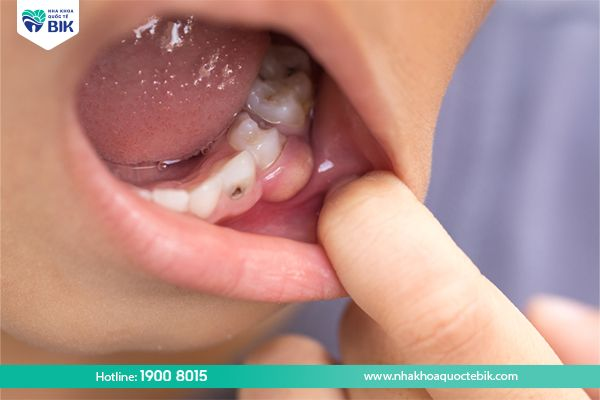
1.4. Trauma
In addition, sudden, unexpected injuries that cause the tooth to chip or chip can also be the cause of toothache.
1.5. Gum diseases
Gum diseases including gingivitis and periodontitis due to the infected gums surrounding the tooth can also cause unpleasant pain.
2. What is the best medicine for toothache?
As mentioned above, toothache can be caused by many reasons and the level of pain depends on the condition of the teeth and the constitution of each person. For each specific case, the appropriate medicine will be used to bring the highest efficiency:
2.1. Paracetamol
The most commonly used medicine today is the pain reliever Paracetamol (also known as Acetaminophen). This is a pain reliever with fever-reducing effects, which can be used for both adults and children. In addition, some other medicines that can be used in parallel with Paracetamol are tetracaine, prilocaine, lidocaine, … which have the function of local anesthesia.
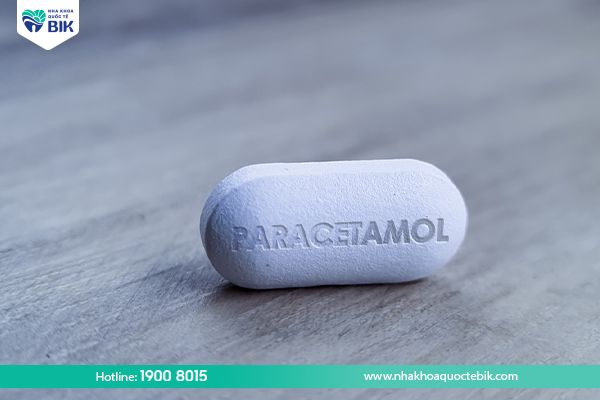
2.2. Antibiotics
Antibiotics are the most common type of medicine that doctors often prescribe in the treatment of dental diseases to relieve pain and help patients feel more comfortable. Beta-lactam antibiotics are often combined with metronidazole to bring the highest efficiency in the treatment of toothache. This is also one of the drugs that effectively prevents the growth of anaerobic and aerobic bacteria.
In addition, some other antibiotics such as tetracycline and amoxicillin are also widely used. During the treatment of toothache using antibiotics, patients need to abstain from alcoholic beverages such as wine and beer to avoid the drug not being fully effective. In addition, patients need to follow the instructions and directions of the doctor because if the wrong dosage is used, it can cause tooth discoloration.
2.3. Non-prescription toothache relievers
Non-prescription pain relievers are drugs that dentists will not prescribe directly to patients. These drugs are sold in most pharmacies nationwide, suitable for treating cases of mild toothache.
Non-prescription pain relievers contain relatively low active ingredients such as aspirin, diclofenac, meloxicam, etc., which have a quick pain-relieving effect. However, patients should not use these drugs for more than 10 days because they can cause many side effects, adversely affecting the stomach, cardiovascular system, etc.
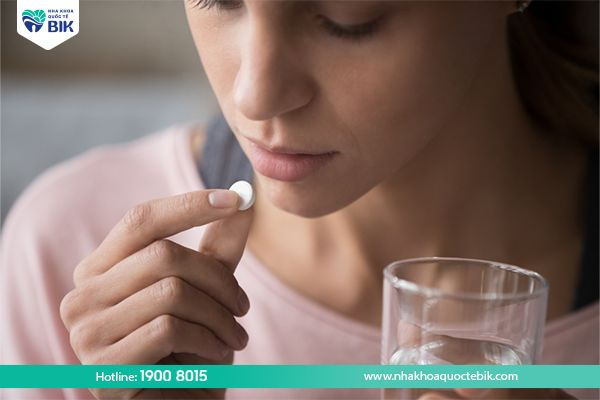
2.4. Non-steroidal anti-inflammatory pain relievers
The common feature of anti-inflammatory pain relievers in the NSAIDs group is that they all contain the pain-relieving active ingredient aspirin and do not contain steroids. This group of drugs is considered a type of active ingredient with a strong pain-relieving effect, which can lead to unwanted side effects for pregnant women, people with cardiovascular disease, etc.
The most common group of non-steroidal drugs includes: Diclofenac, Celecoxib, Ibuprofen, etc.
2.5. Toothache pain relief ointment and spray
Toothache pain relief ointment and spray are local anesthetics used in many dental facilities during the treatment of oral health. However, you can also find and use these toothache pain relievers at home, helping you relieve pain quickly.
To use this medicine, you first need to clean your mouth, especially the gums. Next, apply or spray this anesthetic directly onto the painful tooth, after only about 30 seconds to 2 minutes you will see clear results.
Although this is a pain reliever that is almost immediately effective, it is not recommended to be used as a substitute for conventional toothache treatments. Using a spray or applying it directly to the gums can cause serious damage, even leading to loose teeth and early tooth loss.
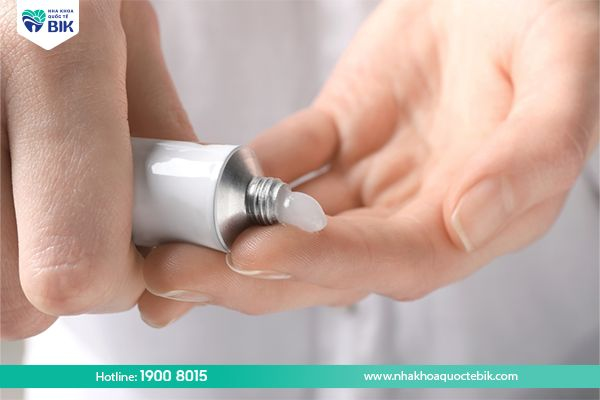
3. Effectiveness of toothache medicine
In terms of effectiveness, the above toothache medicines are rated relatively highly with short-term pain relief effects, but not all cases of using the medicine can bring about the desired effect. In fact, the use of drugs cannot completely kill bacteria and the agents that cause inflammation in patients with periodontitis or tooth decay, so it only temporarily relieves pain and can recur when the drug wears off.
In addition, when abusing toothache medications, it is very easy to lead to drug resistance. The first time using the drug, the patient will see great results, but later on, the dosage must be increased to feel the pain subside a little. In addition, using toothache medications without proper oral care makes it difficult for the drug to work effectively.

4. Notes when using toothache medicine
Toothache medicines can only be highly effective if the patient complies with the instructions and dosage as instructed by the doctor. In fact, some cases of overdose can affect the patient’s life.
When using toothache medicine, there will be different notes for each subject, specifically as follows:
– For children, especially children under 16 years old, pain relievers containing aspirin should be avoided because they can affect their overall development.
– For pregnant and lactating women, pain relievers should absolutely not be used because they can affect the child’s development.
– The elderly are a group that is very sensitive to the ingredients of the medicine, so it is necessary to pay attention to using the correct dosage and ingredients as prescribed by the doctor.

5. Side effects that can occur when using toothache medicine
Although toothache medicine can relieve discomfort immediately after use, it can prevent daily activities from being hindered. However, if not used properly, toothache medicine can cause dangerous conditions such as:
– Drugs containing Aspirin or in the NSAIDs group can damage the mucous membranes in the stomach and digestive system, thereby increasing the risk of ulcers and bleeding.
– Excessive abuse leads to addiction or dependence on painkillers.
– Causes high blood pressure if used for a long time.
– Drugs containing paracetamol, if used incorrectly, can damage the liver and kidneys, causing nausea, liver failure, and kidney failure.
– Painkillers should not be used for people with a history of allergies, autoimmune diseases, the elderly, children, or pregnant women.
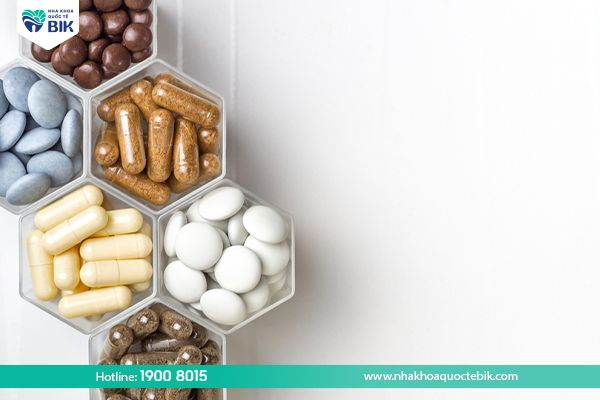
6. What to do if you still have toothache after taking toothache medicine?
There are some cases where even though you use pain relievers, the toothache still does not subside. You can do the following:
6.1. Adjust the amount of medicine
The main reason for using pain relievers but not feeling better is that you are not using the correct dosage as prescribed by your doctor. If you buy non-prescription drugs, you should take the medicine according to the dosage printed on the package. Using the correct dosage of medicine helps the toothache subside quickly.

6.2. Change the type of medicine
Sometimes, the pain reliever you are using may not be suitable for your condition and the condition of your toothache. In this case, you should immediately contact your doctor to change to a more suitable medicine, or prescribe some other types of medicine with mild active ingredients such as non-steroidal drugs, corticosteroids or opioids if the toothache is too severe.
So what medicine to take for toothache will depend on the condition of your teeth and mouth as well as the cause of the toothache to bring the best effect. Although there are still over-the-counter pain relievers, in reality, patients should still go to the dentist for a check-up and use the correct dosage of pain relievers as prescribed by the doctor to minimize dangerous complications later.


















